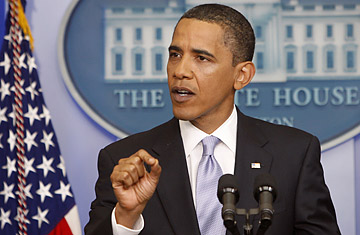
President Barack Obama takes questions from the press on June 23, 2009
"Health care is hard," may be the Obama Administration's catchphrase of the moment, but it's a cakewalk compared with the challenge facing Obama on Iran. Under pressure to turn up the heat on the Iranians — from European allies, Israel and bipartisan consensus on Capitol Hill — Obama had demanded that the Islamic Republic respond by September to a Western offer to resume negotiations or else face escalating sanctions.
Tehran's response came this week, in the form of a package of proposed subjects for talks that included nonproliferation of nuclear weapons but omitted any mention of Iran's uranium-enrichment efforts, which have been the focus of Western anxiety. It's hardly the response Obama hoped for, but the U.S. and its five partners in the P5+1 negotiating group (France, Germany, Britain, Russia and China) went ahead and asked for a meeting with Tehran anyway — if for no other reason than to "test the proposition" that Iran is ready for dialogue, as State Department spokesman P.J. Crowley put it.
The reality, of course, is that even if Iran is ready to engage in a serious negotiating process, its ideas on everything from the agenda and time frame to the outline of an acceptable compromise will be markedly different from those of the U.S. and its allies. And this week's statements from Russia and China opposing any new sanctions highlight the international differences of opinion on Iran that will only make things harder. Russian Prime Minister Vladimir Putin drove home that point in comments reported Friday, stressing that Moscow had no reason to doubt the peaceful intent of Iran's nuclear program.
The U.S. and its allies are not saying Iran is currently developing nuclear weapons; they're warning that allowing Iran to assemble the full nuclear-fuel cycle to which it is entitled as a signatory of the Non-Proliferation Treaty — particularly uranium enrichment — gives it an infrastructure that could quickly be converted to produce bomb matériel. Stating Washington's case at the International Atomic Energy Agency in Vienna this week, Ambassador Glyn Davies warned that Iran had already created enough low-enriched uranium that, if it kicked out nuclear inspectors and reconfigured its enrichment plant, could be re-enriched to provide matériel for a single bomb. "We have serious concerns that Iran is deliberately attempting, at a minimum, to preserve a nuclear option," Davies said.
Moscow sees the problem in terms of strengthening the safeguards against Iran weaponizing nuclear materials, rather than trying to prevent it from attaining "breakout" capacity by denying its right to enrich uranium.
President Mahmoud Ahmadinejad reiterated this week that Iran has no intention of ending uranium enrichment or of negotiating away its nuclear rights. That doesn't necessarily preclude a diplomatic solution to the standoff, but it underscores the likelihood that the Western powers might have to compromise on their own demands in order to achieve one. In some previous rounds of negotiation, Iran has been more open to discussing strengthening the IAEA monitoring regime and other safeguards against weaponization. Right now, however, it's far from clear that Iran is in an accommodating mood, given its fierce and ongoing domestic power struggle.
Ultimately, the fate of diplomacy rests on three factors: Iran's willingness to compromise; the West's willingness to compromise; and perhaps most important, the time frame allowed for negotiations. President Obama is under considerable pressure to show that engagement with Iran produces results — but there may not be any by this fall, the unofficial deadline set by the Administration. If that prompts Obama to seek further sanctions via the U.N. or impose them unilaterally, however, the resulting divide between the West and Russia and China will work to Iran's advantage. New sanctions would also end immediate prospects for a diplomatic solution, because Iran has long declared that it won't negotiate in response to ultimatums. And a continuing stalemate would leave Obama facing either the possibility of an Israeli air strike on Iran's nuclear facilities or being forced into escalating U.S. pressure until Tehran cries uncle. Both options could greatly destabilize the Middle East.
At least on health care, Obama can claim victory with incremental change. On Iran, there is no incremental option: unless Tehran is ready to back down — which appears highly unlikely — the President will be pressed to raise the stakes. And then the game gets truly dangerous.
